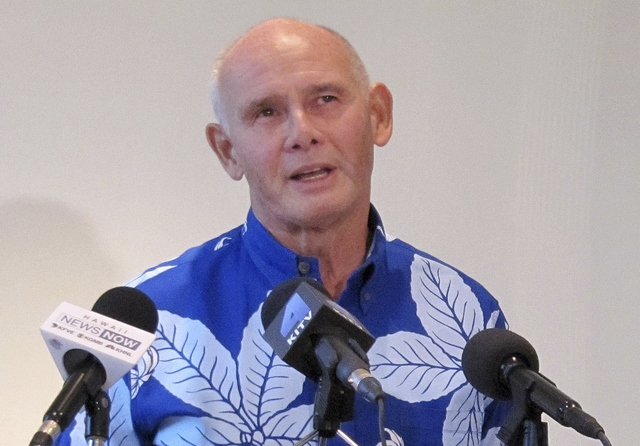HONOLULU (AP) — The decision to cancel an election for Native Hawaiian self-government and skip ahead to a convention has many questioning whether the effort has a chance at achieving anything.
Nai Aupuni, the organization guiding the election process, on Tuesday terminated the election to select 40 delegates who would meet at a convention and come up with a plan for self-determination for Native Hawaiians. Instead, all 196 candidates will be offered seats at the convention, planned for four weeks starting in February.
“The process is just falling apart and it’s getting embarrassing,” said Walter Ritte, a Native Hawaiian activist who ended his short-lived campaign as a delegate candidate because he felt Nai Aupuni was pushing Native Hawaiians toward federal recognition.
Suddenly taking away the opportunity to vote for delegates makes a mockery of any effort toward self-governance, said Native Hawaiian community advocate Trisha Keahaulani Watson-Sproat, who has been a vocal critic of Nai Aupuni.
“I don’t know how anybody is supposed to take any of this seriously at this point,” she said. “I mean, it has the integrity of a Costco membership.”
Native Hawaiians have long sought self-determination, but opinions about what that would look like vary — from federal recognition, to restoring the overthrown Hawaiian kingdom to dual citizenship.
Former U.S. Sen. Daniel Akaka spent about a dozen years trying to pass a bill that would give Native Hawaiians the same rights extended to many Native Americans and Alaska Natives, such as land and cultural rights.
When it became clear that wouldn’t happen, the state passed a law in 2011 recognizing Hawaiians as the first people of Hawaii and laying the foundation for Native Hawaiians to establish their own government.
Then-Gov. Neil Abercrombie appointed a commission to produce a roll of qualified Native Hawaiians interested in participating in such a government.
The commission’s chairman, former Gov. John Waihee, said he’s still processing Nai Aupuni’s announcement.
“At least the positive thing is, it looks like we’re going to have a convention,” he said.
What happens at the convention will be up to the delegates, but they’re expected to organize a leadership structure and attempt to describe a government, said Kuhio Asam, president of Nai Aupuni, an organization created to guide the election process.
Decisions about future voting based on what’s decided at the convention will be made later, Asam said.
“We anticipated that the path would have twists and turns and even some significant obstacles, but we are committed to getting to the aha, where this long-overdue discussion can take place,” he said.
The election met resistance from the start. A group of Native Hawaiians and non-Hawaiians sued to block the election, arguing Hawaii residents who have no Native Hawaiian ancestry were being excluded in violation of their constitutional rights.
The challenge reached the U.S. Supreme Court, which recently granted an injunction to stop the counting of ballots until a lower court ruled on an appeal. In response to the Supreme Court ruling, Nai Aupuni extended voting to Dec. 21. But now that the election has been terminated, ballots will no longer be received. Votes already cast will be sealed and won’t be counted, Asam said.
“Clearly our lawsuit … has brought an end to a discriminatory election,” said Kelii Akina, a plaintiff in the case. “Now, in a desperate move to bypass their failed election and ignore their voter base, Nai Aupuni is undercutting its own efforts to even look like a democratic process.”
State Rep. Kaniela Ing, a delegate candidate, said he’s not sure he’ll accept a seat at the convention.
“If we had known that signing up was a free pass to the table rather than a name on a ballot, the outcome and the process itself would have been completely different,” he said.



